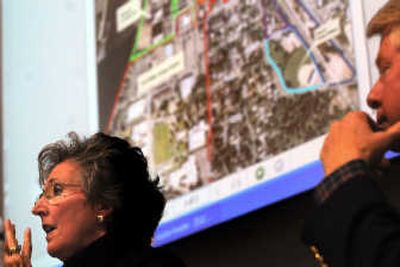Forum addresses NIC land purchase

By North Idaho standards, the public forum Thursday evening at North Idaho College was tame.
It was set up that way.
The crowd of 100 who gathered for a Q-and-A session on the college’s proposed purchase of a 17-acre mill site was forewarned: It’s not a debate. Be on good behavior. No booing, hissing or cheering. And questions were only accepted in writing.
Moderator Mike Patrick, editor of the Coeur d’Alene Press, threatened to have anyone who was unruly escorted out by a bouncer. It didn’t happen.
But the crowd – in writing – had some pointed questions about the college’s proposal to spend $10 million to purchase property for future expansion of the campus.
Panelists, including NIC President Priscilla Bell, Trustee Mic Armon and Coeur d’Alene Mayor Sandi Bloem hailed the purchase as a once-in-a-lifetime chance to create an education corridor stretching from the NIC campus to University of Idaho’s Coeur d’Alene center.
“The long-term regional economical impact is substantial, and it is positive,” Bell said. Having room to expand the campus and increase opportunities to partner with other institutions would make for a better-educated workforce in a changing economy, she said.
Some questioned whether the land was worth the $10 million the college is paying and what would happen if the college is unable to come up with the full amount.
So far, NIC trustees propose pulling $1.5 million from the college’s reserve fund and $400,000 from its operating budget.
Most controversial is the proposal to collect an additional $2.4 million in foregone taxes to help with the down payment – that’s money the college could have collected from taxpayers in the past, but chose not to.
Now the college wants to cash in. For the owner of a $200,000 home, it would mean an increase of about $31 per year in property taxes.
Armon said the college is awaiting an appraisal on the property to determine the value, but he said the college didn’t have time to wait. The mill shuttered its operations earlier than expected.
The hasty closure meant the college didn’t have time to bring the proposal to voters in the form of a bond election, Armon said.
Both Armon and Bloem said they were elected to make tough decisions.
“I think the public did vote,” Bloem said.
“The public voted for a board of directors, a mayor and a council. I do believe we have been charged to make these decisions.”
Bell dismissed concerns that the college was changing its focus away from professional-technical education by expanding its presence in the Fortgrounds neighborhood.
She said the education corridor is not an “either-or.”
The college plans to expand its offerings in all areas, she said.
One member of the audience asked why the college didn’t build up at the current site instead of buying more property.
“There’s only so far up you can go,” Bell said. “We need to be sure we’ve got a footprint of land.”
The panelists were asked how they could justify taking 17 acres of “prime residential and commercial property” off the property tax rolls.
Charlie Nipp, answering questions on behalf of the Lake City Development Corporation, said community colleges and universities add value to a community beyond what would be collected in property taxes.
“Is there a better return than developing a human mind?” he asked. “No.”